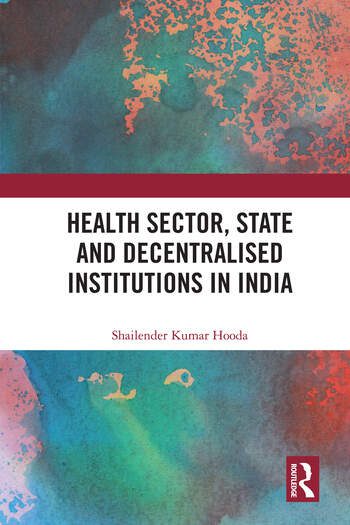
Author(s): Shailender Kumar
Publishers: Routledge, Taylor & Francis Group,
Pages: 276 Pages 31 B/W Illustrations
2021
ISBN: 9781032332420
Health Sector, State and Decentralized Institutions
Book Description
This book describes the transition in Indian healthcare system since independence and contributes to the ongoing debate within development and institutional economics on the approaches towards reform in the public health system. The institutional reform perspective focuses on examining the effective utilisation of allotted resources and improvements in delivery through decentralisation in governance by ensuring higher participation of elected governments and local communities in politics, policymaking and delivery of health services. It discusses the economic (resource) reforms to explain the relevance and expansion of state interventionism along with its influence on the health sector, accountability and allocative efficiency. The author also explores the connections between neoliberal thought and privatisation in health sector, and examines the greater role of insurance-based financing and their implications for health service access and delivery. The book offers ways to address long-standing systemic and structural problems that confront the Indian healthcare system.
Based on large-scale surveys and diverse empirical data on the Indian economy, this book will be of great interest to researchers, students and teachers of health economics, governance and institutional economics, political economy, sociology, public policy, regional studies and development studies. This will be useful to policymakers, health economists, social scientists, public health experts and professionals, and government and nongovernment institutions.
Table of Contents
1. Health System Dynamics: Evolution of Health Policies in India
Part 1: State as a Provider of Health Care Services
2. Investing in Health: Health Policies and Expenditure Priorities
3. Rejuvenating the Public System: Efficiency in Resource Allocation
Part 2: Institutional Reforms: Decentralisation in Service Delivery
4. Politicising the Reprioritisation of Health Expenditure
5. Decentralisation in Health: Rationale, Measurements and Effectiveness
6. Decentralisation, Access and Service Delivery
Part 3: New Financing and Policy Paradigms: Redefining the Role of State
7. Towards Privatising Health Care: At What Cost?
8. Changing Nature of Healthcare Financing: Who Benefits?
Author(s) Biography
Shailender Kumar Hooda is Associate Professor at the Institute for Studies in Industrial Development, New Delhi, India. He completed his PhD in Economics from Jawaharlal Nehru University, New Delhi. He has over a decade of teaching and research experience. Previously, he taught at the University of Delhi and Maharshi Dayanand University, Rohtak, and has worked with the National Council of Applied Economic Research and the National Institute of Public Finance and Policy, New Delhi. He works on the political economy of health and healthcare, health economics and policy, decentralisation in health, corporatisation of healthcare, health and pharmaceutical industry, institutional economics and applied econometrics. He specialises in handling large-scale survey data relating to the Indian economy, and in conducting and designing primary surveys. His writings have appeared in magazines, newspapers and reputed journals. He has delivered several projects funded by national and international agencies.

